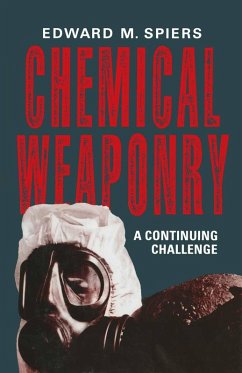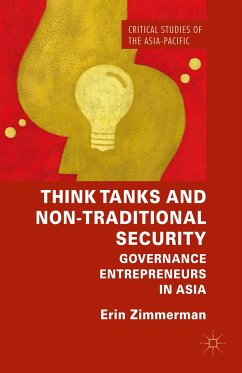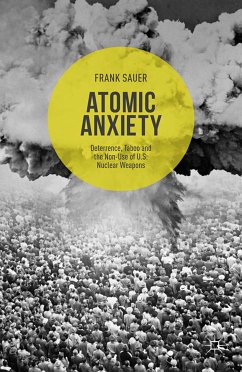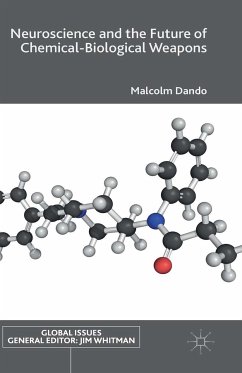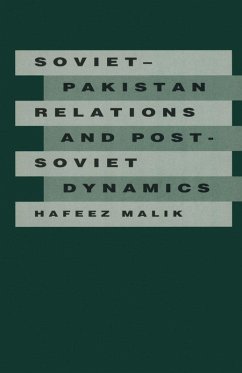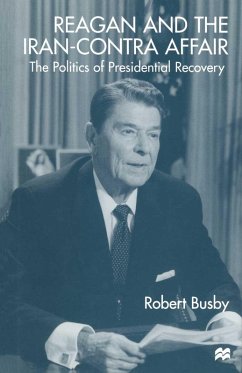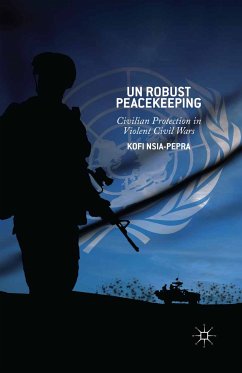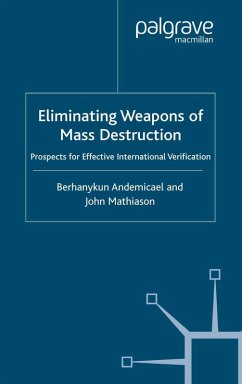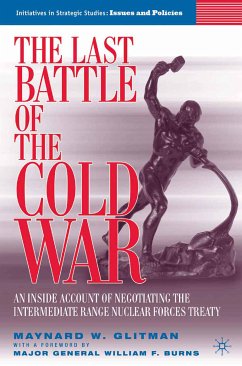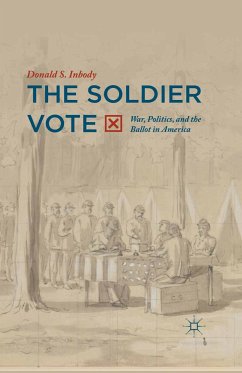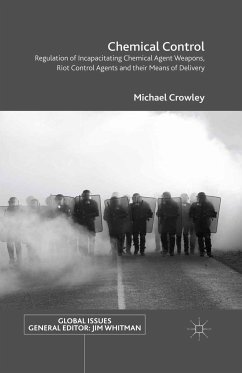
Michael Crowley
eBook, PDF
Chemical Control (eBook, PDF)
Regulation of Incapacitating Chemical Agent Weapons, Riot Control Agents and their Means of Delivery

PAYBACK Punkte
36 °P sammeln!






This thoroughly researched study highlights the international community's failure to regulate contemporary state research, development, marketing and/or deployment of riot control agents and incapacitating chemical agent weapons.
Dieser Download kann aus rechtlichen Gründen nur mit Rechnungsadresse in A, B, BG, CY, CZ, D, DK, EW, E, FIN, F, GR, HR, H, IRL, I, LT, L, LR, M, NL, PL, P, R, S, SLO, SK ausgeliefert werden.
Dr Michael Crowley is Project Coordinator of Bradford Non-Lethal Weapons Research Project, and Research Associate with the Omega Research Foundation. He has worked for over 20 years on arms control and human rights issues, including with Amnesty International, the Arias Foundation, BASIC, and as Executive Director of VERTIC.
Produktdetails
- Verlag: Palgrave Macmillan UK
- Seitenzahl: 378
- Erscheinungstermin: 26. Januar 2016
- Englisch
- ISBN-13: 9781137467140
- Artikelnr.: 44899509
"In Chemical Control, Michael Crowley sets out a three-stage holistic approach to arms control, and illustrates it by applying it to the regulation of incapacitating chemical agents and riot control agents and their means of delivery. ... Here is a strategy in which biologists can apply their expertise and, as the book demonstrates, it has a good chance of working." (Professor Malcolm Dando, The Biologist, Vol. 64 (1), February, 2017)
"His thoroughly-researched book examines in detail ICA weapons, riot control agents (RCAs) and their means of delivery ... . Crowley has not only provided a reference work for policymakers and academics alike, but also a solid framework for structuring debates on the future of disarmament and arms
"His thoroughly-researched book examines in detail ICA weapons, riot control agents (RCAs) and their means of delivery ... . Crowley has not only provided a reference work for policymakers and academics alike, but also a solid framework for structuring debates on the future of disarmament and arms
Mehr anzeigen
control given thatscience and technology are evolving at a greater speed than the international community can regulate, and that existing treaty regimes can be updated." (Noel Stott, African Security Review, August, 2016)
"Michael Crowley's Chemical Control is an impressive piece of scholarship and a valuable addition to the literature surrounding use of chemical weapons and riot control agents and their regulation under international law. ... this is an excellent book, and ... an authoritative reference in the regulation of RCAs and incapacitating chemical agent weapons. It deserves to be widely read and assimilated by lawyers, diplomats, medical professionals, non-governmental organisations, as well as by weapons developers and manufacturers." (Stuart Maslen, International Journal of Human Rights, Vol. 20 (4), March, 2016)
"The monograph offers highly technical and detailed information on the nature of riot control and incapacitating agents and their delivery systems, the research and development behind them, where they are being manufactured and how they are traded ... . commend him for offering a solid framework for structuring that particular debate on the future of disarmament and arms control and identifying the fundamental assumptions underlying both concepts." (Jean Pascal Zanders, The Trench, the-trench.org, March, 2016)
"Michael Crowley makes a compelling argument that ambiguities surrounding riot-control and incapacitating chemical agents as well as their means of delivery present a threat to both human and international security. ... The pragmatic and authoritative approach adopted within this work means that this book will undoubtedly become a reference work for policy shapers and academics for years to come." (Dr. Brett Edwards, Contemporary Security Policy, contemporarysecuritypolicy.org, February, 2016)
"For anyone considering the evolution of the use of chemical substances in different circumstances along with current regulation, Michael Crowley´s book is a must! He tackles the complicated subject of incapacitating chemical agent (ICA) weapons and riot control agents (RCAs). ... I recommend this book not just to people interested in the topic professionally, but most importantly to politicians, diplomats and law enforcement institutions. It is also a must for students of international relations and political sciences ... ." (CBRNe World, cbrne.com, February, 2016)
"Crowley does a good job of structuring his research in a way that helps the reader make sense of the technical aspects of these weapons as well as the complex array of applicable international law. ... Crowley's book is both an invaluable reference and a useful source of new ideas for addressing two problems stemming from the decision by States to prohibit toxicity as a weapon of war while leaving open its use for law enforcement." (Neil Davison, International Review of the Red Cross, 2016)
"This is a timely book, part of a series looking at governance and regulation issues. It provides an unusual case study in what is deemed 'holistic arms control': a three-stage process that is systematically explained here. ... The power of this essential book is in the detail, and the same painstaking work will be necessary in the months and years ahead to demonstrate how these sub-lethal chemical weapons are being increasingly used to contain inequality and injustice." (Steve Wright, Medicine, Conflict and Survival, 2016)
"Crowley's new book and analysis is to be highly recommended to all who are interested in building a world free of a whole class of weapons of mass destruction-chemical weapons-and to those seeking to prevent the re-emergence of deadly chemicals. With almost 100 pages of footnotes and sources, Chemical Control is meticulously documented, making it an excellent reference volume for those interested in arms control, disarmament, relevant multilateral treaties and agreements, as well as national and international enforcement." (Paul F.Walker, Nonproliferation Review, Vol. 22 (3-4), 2015)
"Michael Crowley's Chemical Control is an impressive piece of scholarship and a valuable addition to the literature surrounding use of chemical weapons and riot control agents and their regulation under international law. ... this is an excellent book, and ... an authoritative reference in the regulation of RCAs and incapacitating chemical agent weapons. It deserves to be widely read and assimilated by lawyers, diplomats, medical professionals, non-governmental organisations, as well as by weapons developers and manufacturers." (Stuart Maslen, International Journal of Human Rights, Vol. 20 (4), March, 2016)
"The monograph offers highly technical and detailed information on the nature of riot control and incapacitating agents and their delivery systems, the research and development behind them, where they are being manufactured and how they are traded ... . commend him for offering a solid framework for structuring that particular debate on the future of disarmament and arms control and identifying the fundamental assumptions underlying both concepts." (Jean Pascal Zanders, The Trench, the-trench.org, March, 2016)
"Michael Crowley makes a compelling argument that ambiguities surrounding riot-control and incapacitating chemical agents as well as their means of delivery present a threat to both human and international security. ... The pragmatic and authoritative approach adopted within this work means that this book will undoubtedly become a reference work for policy shapers and academics for years to come." (Dr. Brett Edwards, Contemporary Security Policy, contemporarysecuritypolicy.org, February, 2016)
"For anyone considering the evolution of the use of chemical substances in different circumstances along with current regulation, Michael Crowley´s book is a must! He tackles the complicated subject of incapacitating chemical agent (ICA) weapons and riot control agents (RCAs). ... I recommend this book not just to people interested in the topic professionally, but most importantly to politicians, diplomats and law enforcement institutions. It is also a must for students of international relations and political sciences ... ." (CBRNe World, cbrne.com, February, 2016)
"Crowley does a good job of structuring his research in a way that helps the reader make sense of the technical aspects of these weapons as well as the complex array of applicable international law. ... Crowley's book is both an invaluable reference and a useful source of new ideas for addressing two problems stemming from the decision by States to prohibit toxicity as a weapon of war while leaving open its use for law enforcement." (Neil Davison, International Review of the Red Cross, 2016)
"This is a timely book, part of a series looking at governance and regulation issues. It provides an unusual case study in what is deemed 'holistic arms control': a three-stage process that is systematically explained here. ... The power of this essential book is in the detail, and the same painstaking work will be necessary in the months and years ahead to demonstrate how these sub-lethal chemical weapons are being increasingly used to contain inequality and injustice." (Steve Wright, Medicine, Conflict and Survival, 2016)
"Crowley's new book and analysis is to be highly recommended to all who are interested in building a world free of a whole class of weapons of mass destruction-chemical weapons-and to those seeking to prevent the re-emergence of deadly chemicals. With almost 100 pages of footnotes and sources, Chemical Control is meticulously documented, making it an excellent reference volume for those interested in arms control, disarmament, relevant multilateral treaties and agreements, as well as national and international enforcement." (Paul F.Walker, Nonproliferation Review, Vol. 22 (3-4), 2015)
Schließen
Für dieses Produkt wurde noch keine Bewertung abgegeben. Wir würden uns sehr freuen, wenn du die erste Bewertung schreibst!
Eine Bewertung schreiben
Eine Bewertung schreiben
Andere Kunden interessierten sich für


